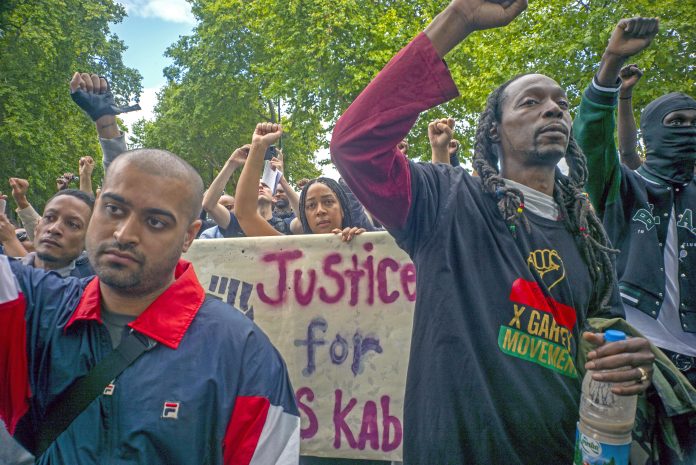Deji Olayinka, South West London Socialist Party
The murder of Chris Kaba by the police was the latest in a long list of tragic cases exposing the many problems in policing, including police racism. The movement of Black Lives Matter was sparked by the killing of George Floyd in the US.
Immediately after each of these dreadful events, the capitalist media works hard to sell the idea that the police actions were justified in some way or an isolated incident. Yet the structural and systematic roots of the issues are clear to see.
Following the murder of Stephen Lawrence, where police racism prevented his murderer from facing justice, the McPherson inquiry found the police to be “institutionally racist”. Similarly, after the violent murder of Sarah Everard by a police officer, the Charing Cross inquiry discovered several cases of “bullying, misogyny, discrimination and sexual harassment”, and the Independent Office for Police Conduct (IOPC) admitted “these incidents are not isolated or simply the behaviour of a few bad apples”. The rot in the police comes from the roots and these consequences are inevitable, as it’s been designed to maintain an oppressive system.
The London Metropolitan Police, the original police force, was created in 1829 by Robert Peel – then Tory home secretary – to quell riots and put down the strikes of the organised industrial working class.
Peel had developed the ideas behind policing while fighting the insurrections and political uprisings of Irish people against the colonial rule of the British elite. But the roots of the system go back further, to slave patrols run in colonies from the early 1700s.
While much has changed since then, the strong link between capitalism, imperialism, racism and policing have continued. In fact, the EU’s first uniformed police force was established to police borders, and
today some of the most violent forms of policing occur at borders, as seen when Spanish police recently killed 23 migrants at the Morocco border.
Today’s police are still used by the capitalist state, to oppress, protect the property of the capitalist class and maintain their desired societal order.
In response to police brutality there have been calls to reform the police, with one of the main methods being through sensitivity and de-escalation training. However, the capitalist state needs the police to defend its system. No matter the training, in the end they rely on police to attack protestors and strikers, as seen in the 1980s miners’ strike.
Similarly, there have been calls to have more Black police to reduce racism. However, as we’ve seen with the recent Tory cabinet, simply being Black or Brown doesn’t guarantee an anti-racist approach.
Hold account
Police bodycams have also been suggested as a solution. But the police still batter unarmed civilians while wearing bodycams. Even when the footage is released and reaches the news or goes viral, the victims don’t get justice.
Recording the crimes of the police isn’t enough. What matters is if the victims and the community have the power to hold the police accountable for their actions. What’s needed is a justice system that works for ordinary working people, and for that we need democratic control of the police.
Socialists should fight for reforms that improve the situation but also understand that under capitalism the ‘war on drugs’, the ‘war on terrror’ and the ‘war on crime’ will still continue to be fought on a layer of people perpetually labelled as potential criminals, including the poor, the young, the Muslim and the darker skinned. As Alex Vitale wrote in the End Of Policing, “A kinder, gentler, and more diverse war on the poor is still a war on the poor”.
When faced with a systematically racist, classist and brutal policing and justice system, it’s no wonder that there have been calls for police abolition! It is understandable that such a demand is raised – for a layer of young people it seems to only makes sense to get rid of the harmful policing system that does not protect us. However, an overwhelming majority of people think that a force is needed to prevent crimes that harm working-class people such as murder, theft and rape.
What we need is democratic workers’ control of the police, managed by bodies made up of representatives of the working class, elected from community groups and trade unions. So that the police are accountable, and actions are immediately taken if any code of conduct is broken. These elected committees would be responsible for day-to-day policing policies, and ensure a genuinely independent complaints procedure.
Socialists fight to immediately end stop and search, demilitarise the police and abolish the Territorial Support Group, Special Branch, and other similar units. We also demand the end of police spying, which has mainly been carried out on left-wing, anti-racist and Black justice campaigns and activists, as exposed in the Spy Cops scandal. And any personal records kept by the police not connected with criminal investigations must be destroyed.
Socialist democratic planning of the economy would enable the living standards of the majority in society to improve, and so dramatically reduce the breeding ground for most crime.
Crime prevention would move beyond policing. A mass council house building campaign would be used to address homelessness, a fully funded NHS could be the first driving point to prevent drug misuse. It could begin to eradicate youth crime by reinstating youth clubs, social services, and libraries, alongside guaranteeing youth a future through free higher education and training, with decent jobs guaranteed.
Under socialism, through the removal of profit-driven class society, we could have a restorative justice system that focuses on rehabilitating offenders and reintegrating them into society. A socialist society, based on equality and cooperation, would lay the basis for a way of organising society that can keep people safe and that is democratically controlled, without racism, sexism, LGBTQ+ phobia and class oppression.







